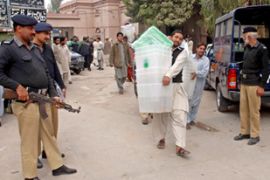Security tight for Pakistan vote
Forces on alert after weekend attacks as Pakistanis prepare to vote in Monday’s polls.

| Your Views |
Pakistan has been hit by a wave of suicide attacks since Benazir Bhutto, the leader of the Pakistan People’s Party (PPP), was killed in a suicide and gun attack at a political rally in Rawalpindi in December.
On the political front, Bhutto’s widower, Asif Ali Zardari, met Nawaz Sharif, a former prime minister and leader of the Pakistan Muslim League-N, in Lahore, the capital of Punjab, on Saturday.
They discussed possible power sharing after the vote if the opposition won a majority, according to party officials.
Protest threat
Both the PPP and PML-N have complained of widespread rigging by allies of Pervez Musharraf, the Pakistani president, and have threatened to launch protests if they are robbed of victory.
Musharraf, who retired from the army in November, rejects complaints of rigging and says procedures have been refined to prevent cheating.
| Main parties |
|
Pakistan People’s Party: Late Benazir Bhutto’s party is now led by her widower Asif Ali Zardari and son Bilawal Bhutto Zardari. An arrow is its symbol on the ballot.
Pakistan Muslim League-N: Led by two-time prime minister Nawaz Sharif, the party is fiercely opposed to Musharraf. The tiger is its symbol on the ballot.
Pakistan Muslim League-Q: The ruling party after the 2002 poll, it supports Musharraf. A bicycle is its symbol on the ballot. |
He says he is ready to work with whichever party forms a government and chooses a prime minister.
In all, 106 parties are contesting, of which 15 were represented in the last parliament.
In 2002 the governing PML-Q won 130 seats and three allied parties won another 53 seats.
The PPP had 63 seats; an alliance of six conservative Muslim parties called the Muttahida Majlis-e-Amal or United Action Front won 59, and the PML-N won 18.
This time around, the Muttahida Majlis-e-Amal is expected to fare badly, although this has more to do with its failure to bring improvement in NWFP, analysts say.
Smaller parties, including that of Imran Khan, nationalist groupings and independents won 19.
Polling schedule
Polling stations across Pakistan open on Monday at 8am local time (0300 GMT) and close at 5pm (1200).
Ballots will be counted in polling stations where they are cast and results are expected to start coming out towards midnight on Monday.
| Special report |
The trend in the battleground province of Punjab, where half the members of parliament will be elected, should be clear late on Tuesday morning, with unofficial results out later in the day.
Several US legislators are planning to observe the vote.
They include Sheila Jackson Lee, a Democratic Party politician, who said on Sunday that the US would be “very serious in its response” if the election is flawed.
Fragile security
Some 81,000 army and paramilitary soldiers have fanned out across the country to try to maintain peace and security during the election.
Saturday’s biggest attack in the NWFP occurred at a rally of the PPP in the tribal town of Parachinar, which lies opposite the Afghan area of Tora Bora.
| In video |
Parachinar was still tense on Sunday. Fifteen of the most seriously wounded were taken by helicopter to a hospital in the NWFP capital, Peshawar.
A second suicide bomber on Saturday attacked an army media centre in the northwestern region of Swat, killing two civilians and wounding eight other people.
Elsewhere, armed groups in the tribal region of Bajaur blew up a polling station, while police in the southern city of Hyderabad said they had arrested three suspects equipped with suicide jackets who were planning an attack during the polls.
And in the southwestern city of Quetta police fired tear gas and used batons to disperse a rally by a coalition of opposition parties boycotting the elections.

